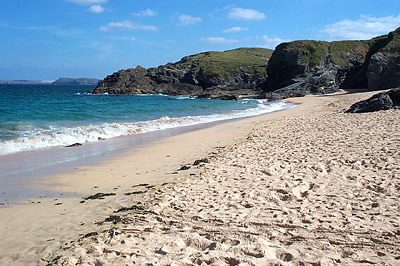In 1855 Thomas Quiller Couch wrote of Cornwall: “The belief in witchcraft holds its ground firmly and of all superstitions it will probably be the last to die out.” An opinion that was reinforced one hundred and twenty years later in 1973 when a national Sunday newspaper carried an article about a field near Mother Ivey’s Bay.
The field was part of Lower Harlyn Farm and overlooks the small bay close to Padstow. The paper reported that this particular patch of ground hadn’t been used to graze livestock or grow crops for more than a century. And the reason? An ancient curse.
The bay was once known as Polventon Bay, meaning ‘the cove with a spring’ but it is believed to have been renamed sometime in the 19th century after a local character, Mother Ivey, who, legend has it, was a white witch. The earliest reference to this name for the cove comes from a newspaper article in the Cornish Telegraph from 1855, which describes “the schooner Regis of Plymouth” being wrecked at “Mother Ivey’s Bay near Trevose Head.” But it is unclear when the name first came into common usage.
The legend of Mother Ivey
The legend of the curse however is said to be from far earlier, possibly from the 16th century, when Padstow was an important fishing port. The story goes that a wealthy family from Harlyn Bay incurred the wrath of Mother Ivey for their selfish neglect of poor and starving local people. The family were large producers of pilchards which they sold to the Italian market and on one occasion their deal fell through and they were left with a substantial cargo of unsold fish. The pilchards were set to spoil but rather than offer them to the needy locals the family had the barrels of fish emptied on to the fields above the bay and ploughed in as fertiliser.
Mother Ivey was livid and she cursed the ground saying “If ever its soil was broken, death would follow”. At first the family did try to plant a crop but all work came to abrupt halt when soon after the eldest son was killed when he was thrown from his horse while crossing the field.
The curse lives on
Even during the Second World War when every available plot of land was utilised to produce food for the nation this field still lay fallow. The Home Guard did dig some trenches across it however and it is said that within days the then owner’s son was killed in action.
In the 1970s attempts were made to break the curse. One of the owners, Mrs Mary Rees, consulted a local wise woman who apparently spoke “a strange incantation” over some strips of cloth and then told Mrs Rees to bury them in the field. This was done but the tenant farmer, Mr Bennett, still refused to turn the ground reportedly saying, “I wouldn’t plough up that field, not for any money!” It seems that it still lies uncultivated to this day.



